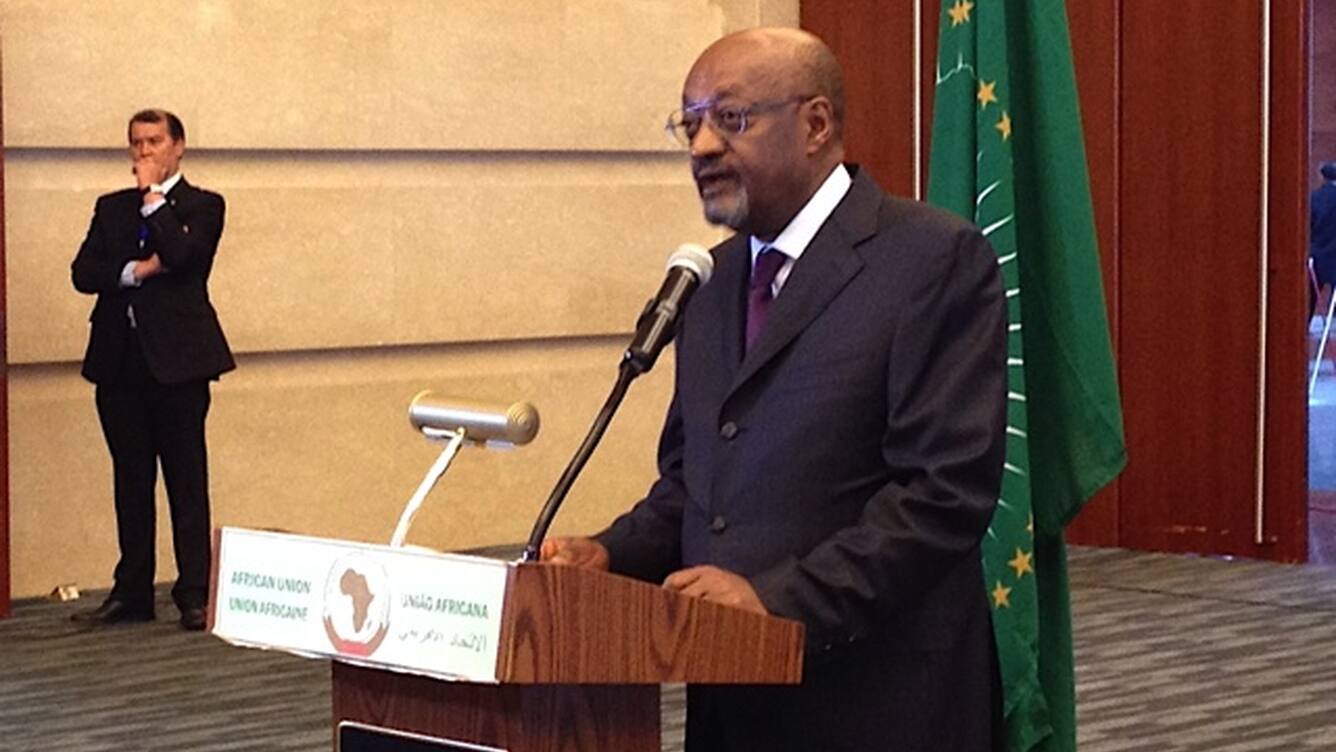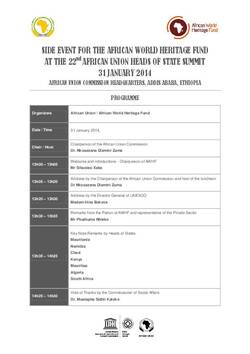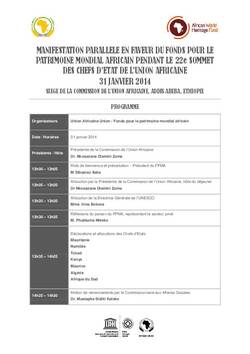Over 3 million USD pledged for the African World Heritage Fund at African Union Head of State Summit
On Friday 31 January 2014, UNESCO joined forces with the African Union Commission to raise awareness and funds for the African World Heritage Fund (AWHF) during the African Union (AU) Heads of State luncheon at the AU Headquarters in Addis Ababa, Ethiopia. Participants pledged a total of 3,050,000 USD in support of the AWHF Endowment Fund.
54 Member States of the African Union were invited to the luncheon, which was hosted by Dr Nkosazana Dlamini Zuma, Chairperson of the African Union Commission. The Head table included seven Heads of State, five Vice-Presidents, and 16 Prime Ministers, Ministers of Foreign Affairs and Ministers of Culture.
UNESCO’s Deputy Director General, Mr Getachew Engida, gave a keynote address on behalf of UNESCO’s Director General Mrs Irina Bokova, which highlighted UNESCO’s commitment to supporting the AWHF, and stressed that “the AWHF is vital for mobilizing the full power of Africa’s natural and cultural heritage for sustainable development.” He called upon all heads of state to support the work of the AWHF and appealed for contributions to their Endowment Fund.
Over 3 million USD was pledged to the AWHF Endowment Fund by the Governments of Kenya (1.5 million USD), South Africa (1 million USD), Algeria (400,000 USD), Chad (100,000 USD), and Namibia (50,000 USD). In addition, Algeria announced the secondment of an Algerian Specialist to work for the AWHF, as well as the creation of a UNESCO Category II Centre in Algeria for the safeguarding of Intangible Cultural Heritage. The Prime Minister of Mauritius announced his country’s intention to donate to the Endowment Fund in the near future.
Although the Endowment Fund needs 25 million USD in order to render the AWHF independent and fully functional, these contributions were indeed a welcome support, and will help continue the important work the AWHF is carrying out alongside the UNESCO World Heritage Centre, Secretariat of the 1972 UNESCO World Heritage Convention, to increase the number of African sites on the World Heritage List and the capacities of African Member States to manage and promote their heritage.
During their various addresses, the Chairperson of the African Union Commission, the Chairperson of the AWHF, the Heads of State and the patron of AWHF and representative of the Private Sector, all acknowledged the central role the AWHF plays in safeguarding heritage in Africa. They unanimously thanked UNESCO for the important role played in supporting the AWHF. They expressed their wish for more natural and cultural sites in Africa to be inscribed on the UNESCO World Heritage List. The potential of tourism from World Heritage sites in Africa and the direct economic benefits they can bring to local communities was also highlighted. Lastly, they called for all African countries to ratify the World Heritage Convention.
Following this important gathering of Heads of State, the UNESCO World Heritage Centre is planning a side event on African World Heritage to be held on 16 June 2014 in Doha, Qatar during the 38th session of the World Heritage Committee. This meeting will provide another opportunity for African States Parties to the World Heritage Convention to learn more about the significant accomplishments and the untapped potential of the African World Heritage Fund to contribute to the promotion and protection of Africa’s rich natural and cultural heritage for all humanity.
Created in 2006 through a joint initiative by the Government of South Africa, the African Union and UNESCO, the African World Heritage Fund is an intergovernmental organization based in South Africa whose mission is to assist African countries in: increasing the number of African sites on the UNESCO World Heritage List, conserving and managing natural and cultural heritage, rehabilitating sites on the List of World Heritage in Danger, training heritage experts and site managers, and ensuring the participation of local communities in decisions concerning their heritage and to ensure that they receive tangible benefits from World Heritage.


